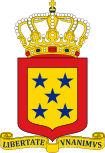Islands Regulation of the Netherlands Antilles
 |
|---|
The Islands Regulation of the Netherlands Antilles (Dutch: Eilandenregeling Nederlandse Antillen or ERNA; Papiamento: Regulashon Insular delas Antias Hulandes or RIAH) described the autonomy of the different island territories of the Netherlands Antilles. It was enacted on 3 March 1951 by royal decree and remained in force, in a consolidated form, until the dissolution of the Netherlands Antilles on 10 October 2010.[1] Together with the Constitution of the Netherlands Antilles, the Island Regulation described the foundation of the government of the Netherlands Antilles.
The fact that the Constitution of the Netherlands Antilles depended on the Island Regulation, and the fact that the Island Regulation was older than the Constitution, has led many scholars to describe the Netherlands Antilles as a federal arrangement.[2]
Island territories
| Flag | Name | Capital | Area (km²) | Remarks |
|---|---|---|---|---|
| Curaçao | Willemstad | 444 | ||
| Bonaire | Kralendijk | 288 | ||
| Sint Maarten | Philipsburg | 34 | Were part of the island territory of the Windward islands until 1 January 1983 | |
| Sint Eustatius | Oranjestad | 21 | ||
| Saba | The Bottom | 13 | ||
| Aruba | Oranjestad | 193 | Seceded on 1 January 1986 | |
| Netherlands Antilles | Willemstad | 993 |
Notes and references
- ^ Overheid.nl - KONINKLIJK BESLUIT van 3 maart 1951, houdende de eilandenregeling Nederlandse Antillen
- ^ Borman 2005:56
- C. Borman (2005) Het Statuut voor het Koninkrijk, Deventer: Kluwer.
